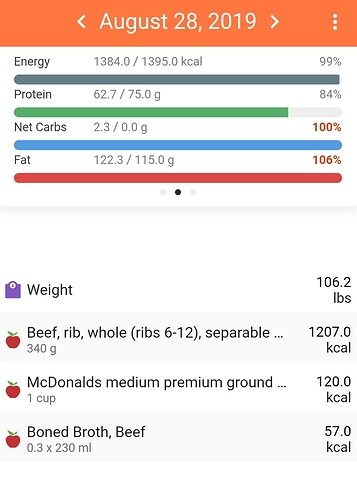Here is what I mostly eat. Beef ribs, short ribs, rib eye, chuck roasts, lamb shoulder or stewing lamb, fatty ground beef, very fatty sausages and of course pork belly and bacon. However, for me the trick is all in how I cook all these things.
I had a cooking revelation when I bought and began using a sous vide. When you cook something at a very, very low temperature for a long time it becomes incredibly tender while maintaining both rareness (which I love) and all of its fat. In fact I can no longer get correct macros from using reports of cooked foods since standard cooking renders a lot of fat. I now use reports from raw meats to figure my macros.
Anyhow, what I’ve discovered is that I don’t even have to use my sous vide to get this result. I can pop any cut of meat in the oven and cook low and slow for the exact same effect. Honestly, I think that I prefer the result this way. A lot of flavor comes out in the sous vide juices and this doesn’t happen in the oven.
Also, the oven, for some reason that I don’t understand, results in better rareness at higher temperature cooking than the sous vide. So while I’d cook beef ribs for 36 hrs at 130 degrees in the sous vide I find that I actually prefer 6 hours at 150 degrees in the oven.
Eating meat fat when it hasn’t been rendered out of it’s natural protein structure massively improves my digestion and satiety.
For ages I avoided ground beef entirely because no matter how fatty the original grind was it all got delivered to my system as rendered fats that would make me feel terrible if I consumed enough, and this led to overconsumption of protein which also makes me feel crappy (not to mention that excess protein leads me to overeat in the next 12 hours and affects both my level of ketosis and physiology associated with that level such as mood, energy, and brain fog). Now I just cook a ground beef patty in the oven for a couple of hours at a low temperature and then give it a few seconds in a pan on each side to deliver the flavours of the sear. Almost all the fat stays in the burger and honestly, it’s just waaaay better.
The same applies to how I cook fatty sausages and bacon now. All the fat stays in.
Anyhow, I don’t want to write a book here about how I cook but if this interests you feel free to hit me up for more details. The same applies for anyone else.



 I do feel better when I eat pork belly but wanted more options than that
I do feel better when I eat pork belly but wanted more options than that 

